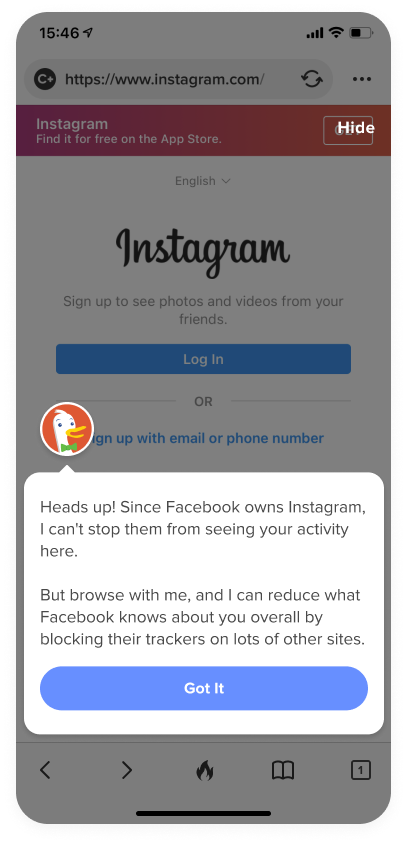First-Party Trackers

Previous Copy
Head's up! Instagram.com is owned by Facebook.
Facebook's trackers lurk on about 40% of top websites 😱 but don't worry!
I'll block Facebook from seeing your activity on those sites.
Problem
We needed to revise a dialog informing users that the DuckDuckGo Privacy Browser app was unable to block Facebook's trackers when users visited the Instagram website. From user testing, we found that users thought the dialog meant that the app would protect them from Facebook's trackers.
Solution
Heads up! Since Facebook owns Instagram, I can't stop them from seeing your activity here.
But browse with me, and I can reduce what Facebook knows about you overall by blocking their trackers on lots of other sites.
Process
We used a combination of PickFu and UserTesting.com to evaluate user comprehension of new variants. The challenge involved explaining the concept behind first-party trackers (when a company owns a site and uses tracking) versus third-party tracking (other companies' trackers on a site), which the app blocks.
We knew from testing that users didn't understand the terms "first-party" or "third-party," so we needed to exclude those from the copy.
The best solution was to tell users upfront that Facebook owned Instagram, so we couldn't block them from seeing the user's activity there. That said, we wanted to reassure users that while we couldn't protect them from Facebook on Instagram.com, we could protect them elsewhere and reduce Facebook's data profile on them overall.
Results
User testing confirmed that users understood the new dialog correctly. The general sentiment was that users liked how DuckDuckGo was honest about its limitations, which made them trust the app more. They also expressed dissatisfaction over Facebook forcing tracking even in a privacy app, which made users trust Facebook less. Double win!
